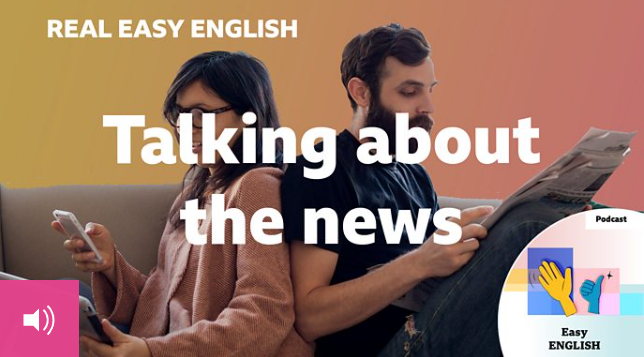Introduction
Beth and Neil have a real conversation in easy English about the news. Learn to talk about how much you read the news.
Vocabulary
follow the news
be interested in the news
too
more than is needed of something
enough
as much as is needed of something
already
before now
Transcript
Beth
Hello. You’re listening to Real Easy English from BBC Learning English. I’m Beth.
Neil
And I’m Neil. This is the podcast where we have real conversations in easy English for you to listen along and learn.
Beth
As always, you can find a text version of this episode to read along on our website: bbclearningenglish.com
Neil
So, Beth, how are you this week?
Beth
I’m very good, thank you. How are you, Neil?
Neil
I’m very well, thank you. What are we talking about today?
Beth
We are talking about how much we follow the news.
Neil
Ah, the news! OK, so what do we mean by follow the news?
Beth
So, when we say follow the news, it means that you are interested in the news. So you might read it on your phone, listen to it on the radio or watch it on TV quite regularly.
Neil
Yes, and you can also follow sports, can’t you? So if you like a particular, for example, football team, you might check your phone a lot to find out the score, to follow and see how they’re doing.
Beth
Yeah, exactly. So, Neil, do you follow the news?
Neil
Yes, I think it’s difficult not to follow the news. First thing in the morning, I look on my phone to see if anything big has happened overnight, and then I check a lot during the day just to see what’s happening. So I do follow the news. How about you?
Beth
Yes, I’m the same. So I get notifications on my phone throughout the day, but sometimes I find that that’s a little bit too much. Sometimes you need a break when you’re working and you don’t want to see the news all the time, and my phone does notify me a lot about the news.
Neil
Yeah, I think you can have too much news and it can be not very good for you to read lots of usually quite bad news.
Beth
Yes, definitely. So, why do you like to follow the news, even though it can be too sad?
Neil
That’s a very good question. I think it’s a bit of a habit. It’s a bit addictive and I think we sometimes feel like we need to know what’s happening, even if we have actually no control over what is happening.
Beth
Yeah, I completely agree because even though I get notifications and I read the news, I sometimes feel like I still don’t know enough about what’s going on because there’s so much information out there, and so many different ways to get the news that it’s not enough to just read one article. There’s so much information that you want to understand.
Neil
So, Beth, we work at the BBC.
Beth
We do.
Neil
It’s a news organisation. Have your news habits changed since you started working at the BBC?
Beth
Yes, I think they definitely have. I think I probably pay more attention to the news now than I did in the past and… For example, I already knew some information about certain topics, but now I want to learn even more. So I try to pay more attention to things that maybe I wasn’t as interested in in the past. What about you? Does working at the BBC mean you pay more attention to the news?
Neil
Well, I used to be a journalist at the BBC. So probably I used to pay more attention or follow the news more than I do now because now I make these programmes about English.
Beth
Maybe it’s good that you don’t follow the news as much as you did, because it’s not always good.
Neil
It’s not. It’s often bad news.
OK, let’s recap the vocabulary we learned during the conversation.
Beth
We had follow the news, which means to be interested in the news.
Neil
We used too, and too means more than is needed of something, so I watch too much news.
Beth
We also had enough, which means as much as is needed of something. So if you think you watch enough news, you don’t need more and you don’t need less.
Neil
And we’ve had already, which means before now.
Beth
Yes, I said that before I worked at the BBC, I already followed quite a bit of news.
And I can’t believe it is already the end of this episode and it’s the end of the series!
Neil
Yes, that’s sad news! So we will be back with more easy English podcasts for you. But for now, you can find lots more activities and courses to help with your English on our website: bbclearningenglish.com
Beth
Thank you for listening. See you soon.
Neil
Bye.
